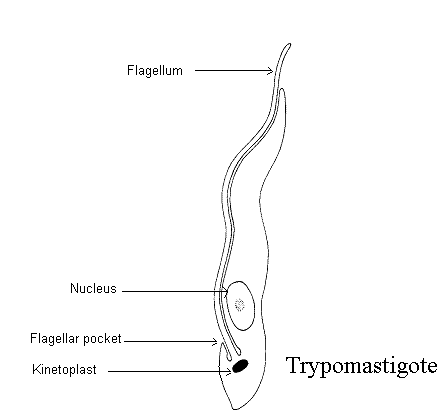Difference between revisions of "Trypomastigote"
From Knoesis wiki
| (7 intermediate revisions by 3 users not shown) | |||
| Line 1: | Line 1: | ||
| − | + | Trypomastigote is an extracellular "non-replicative" form of a parasite. It is a leaf-like form with undulating membrane and flagellum that emerges through a flagellar pocket and runs the whole length of the cell. A large kinetoplast is found at the base of the flagellum; i.e., posterior end of the cell. Trypomastigote is found in the bloodstream of infected vertebrate host. | |
| − | Seen in [[Trypanosoma cruzi]] and [[Trypanosoma brucei]]. | + | [[image: Trypomastigote.GIF]] |
| + | |||
| + | Seen in ''[[Trypanosoma cruzi]]'' and ''[[Trypanosoma brucei]]''. Can be either [[metacyclic]] in ''T. cruzi'', or [[procyclic]] and [[bloodstream form]] in ''T. brucei''. | ||
| + | |||
| + | Reference: | ||
| + | |||
| + | 1) http://dna.kdna.ucla.edu/parasite_course-old/Default.aspx | ||
[[Category: Tcruzi]] [[Category:Parasite Life Cycle ontology]] | [[Category: Tcruzi]] [[Category:Parasite Life Cycle ontology]] | ||
Latest revision as of 14:04, 17 August 2009
Trypomastigote is an extracellular "non-replicative" form of a parasite. It is a leaf-like form with undulating membrane and flagellum that emerges through a flagellar pocket and runs the whole length of the cell. A large kinetoplast is found at the base of the flagellum; i.e., posterior end of the cell. Trypomastigote is found in the bloodstream of infected vertebrate host.
Seen in Trypanosoma cruzi and Trypanosoma brucei. Can be either metacyclic in T. cruzi, or procyclic and bloodstream form in T. brucei.
Reference:
1) http://dna.kdna.ucla.edu/parasite_course-old/Default.aspx
